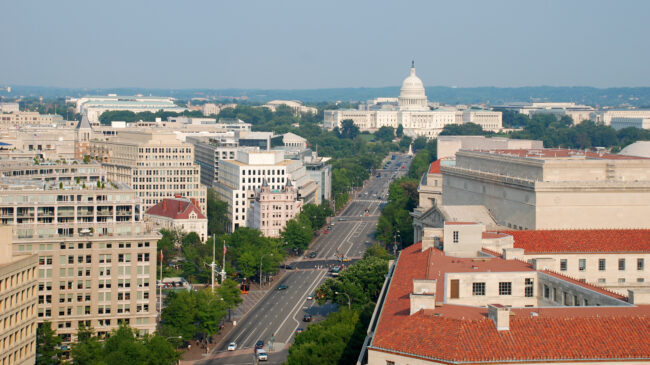On June 13, the White House Office of Management and Budget’s Office of Information and Regulatory Affairs (OIRA) finally published the Spring 2023 edition of the Unified Agenda of Regulatory and Deregulatory Actions that had been due in March. The Unified Agenda is the biannual snapshot of the federal administrative state and tracks the thousands of regulatory actions across hundreds of agencies. While imperfect in many ways, it provides valuable insight into forthcoming federal agency actions.
I previously examined the transportation rulemaking in Fall 2022, Spring 2022, Fall 2021, Spring 2021, and Spring 2020 editions of the Unified Agenda for Reason Foundation. From a historical perspective, Figure 1 below shows the current volume of regulatory activity at the U.S. Department of Transportation is typical of what has been seen since the Obama administration.

The Spring 2023 Unified Agenda lists 235 active rulemaking projects at the U.S. Department of Transportation. Of those 235, 24 are new rulemaking projects first published in the Spring 2023 edition, listed in Table 1 at the bottom of this article. The latest edition of the Unified Agenda contained no new rulemaking projects deemed “economically significant,” which is defined by Executive Order 12866 (1993) as regulations that would have an annual impact on the economy of $100 million or more or otherwise “adversely affect in a material way the economy, a sector of the economy, productivity, competition, jobs, the environment, public health or safety, or State, local, or tribal governments or communities.” While no new projects are classified as such, 13 economically significant rulemaking projects are currently in development at the U.S. Department of Transportation.
The pace of new rulemaking projects at the U.S. Department of Transportation increased slightly in the first half of 2023. This upward trend will likely continue, given the divided 118th Congress that ended unified Democratic control of the legislative and executive branches. Generally, administrations facing divided government and, thus, a more challenging legislative environment tend to shift policymaking attention to regulation in order to bypass legislative gridlock.
According to the Spring 2023 Unified Agenda, the Biden administration will continue its aggressive re-regulatory campaign against supposedly “unfair” airline business practices. It announced two new rulemakings on seat selection fees and airfare refunds, as well as a third on enforcement procedures that was published on June 16. In 1978, Congress ordered that a “maximum reliance on competitive market forces” replace 40 years of failed command-and-control regulations governing nearly every aspect of the airline business. However, it left in place a vague consumer protection statute allowing federal bureaucrats to police against “unfair” practices without defining what “unfair” means. In recent years, the U.S. Department of Transportation has chipped away at airline deregulation by using the unfairness statute to bring new questionable mandates into force.
To prevent bureaucrats from using the vague unfairness statute as an end run around Congress’s Airline Deregulation Act, Congress could clarify the definition of “unfair” by bringing it into line with similar definitions in statutes governing the Federal Trade Commission (15 U.S.C. § 45(n)) and Consumer Financial Protection Bureau (12 U.S.C. § 5531(c)), which have jurisdiction over nearly every other consumer protection area other than aviation. Reason Foundation has produced model language for this simple fix that would require aviation consumer protection regulators to balance their proposals against a targeted practice’s “countervailing benefits to consumers or to competition”—in essence, a robust cost-benefit analysis.
Another interesting newly announced rulemaking project is the National Highway Traffic Safety Administration’s (NHTSA) forthcoming proposal on an exemption and demonstration framework for vehicles equipped with automated driving systems (ADS). Novel ADS-equipped vehicles may not comply with existing Federal Motor Vehicle Safety Standards (FMVSS) and so must seek exemptions from the provisions of FMVSS for which they are non-compliant.
Updating FMVSS to incorporate ADS technologies is expected to take a decade, so FMVSS exemptions will be important for near-term deployments. The FMVSS exemption process can also be harnessed to inform future FMVSS modernization activities to fully incorporate ADS-equipped vehicles into the national auto safety regulatory framework, which is discussed in more detail in a recent Reason Foundation policy brief.
To date, only a single ADS-related exemption request has been granted (in February 2020 to Nuro), and the process for demonstrating the required equivalent level of safety remains opaque. General Motors’ petition for its purpose-built Cruise Origin driverless taxi vehicle has been pending since February 2022. Hopefully, this new rulemaking project will deliver clarity to ADS developers and speed up the exemption process.
Table 1: U.S. Department of Transportation Rulemaking Projects First Published in the Spring 2023 Unified Agenda
USDOT Rulemaking Projects, Spring 2023
| Agency | Stage of Rulemaking | Title | RIN |
|---|---|---|---|
| OST | Proposed Rule | Family Seating in Air Transportation | '2105-AF15' |
| OST | Proposed Rule | Floodplains Management and Protection | '2105-AF17' |
| OST | Proposed Rule | Clarification of Formal Enforcement Procedures for Unfair and Deceptive Practices | '2105-AF18' |
| OST | Proposed Rule | Rights of Airline Passengers When There Are Controllable Flight Delays or Cancellations | '2105-AF20' |
| OST | Final Rule | Revisions to Civil Monetary Penalty Amounts, 2024 | '2105-AF16' |
| OST | Final Rule | Standard Time Zone Boundaries Technical Corrections | '2105-AF19' |
| FAA | Proposed Rule | Falsification, Reproduction, Alteration, Omission, or Incorrect Statements. | '2120-AL84' |
| FAA | Proposed Rule | U.S. Agents for Service on Individuals With Foreign Addresses Who Hold or Apply for Certain Certificates, Ratings, or Authorizations | '2120-AL85' |
| FAA | Proposed Rule | Passenger Facility Charges | '2120-AL86' |
| FAA | Proposed Rule | Disclosure of Safety-Critical Information | '2120-AL87' |
| FAA | Proposed Rule | Changed Product Rule | '2120-AL88' |
| FAA | Proposed Rule | Revision of Robinson Helicopter R-22 and R-44 Special Training and Experience Requirements | '2120-AL89' |
| FAA | Final Rule | Extension of the Prohibition Against Certain Flights in the Pyongyang Flight Information Region (FIR) (ZKKP) | '2120-AL90' |
| FAA | Final Rule | Extension of the Prohibition Against Certain Flights in the Damascus Flight Information Region (FIR) (OSTT) | '2120-AL91' |
| FMCSA | Proposed Rule | Transparency in Property Carrier Broker Transactions | '2126-AC63' |
| FMCSA | Proposed Rule | Registration of Household Goods (HHG) Motor Carriers; Methods to Demonstrate Qualifications and Knowledge of Federal Regulations | '2126-AC64' |
| NHTSA | Proposed Rule | Exemption and Demonstration Framework for Automated Driving Systems | '2127-AM60' |
| NHTSA | Proposed Rule | Early Warning Reporting Regulations | '2127-AM61' |
| NHTSA | Final Rule | Federal Motor Vehicle Theft Prevention Standard, MY 2021 High-Theft Light-Duty Truck and Exempted Vehicle Line Listing | '2127-AM59' |
| FRA | Proposed Rule | Amendments to the Freight Car Safety Standards Implementing the Safe Trains Act | '2130-AC94' |
| MARAD | Proposed Rule | Cargo Preference--U.S. Flag Vessels Regulatory Update | '2133-AB97' |
| MARAD | Proposed Rule | Amendment to the Federal Ship Financing Program Regulations; Financial Requirements | '2133-AB98' |
| MARAD | Final Rule | Establishing Safe and Secure Merchant Marine Training | '2133-AB99' |
| PHMSA | Proposed Rule | Administrative Rulemaking - Regulatory Procedures | '2137-AF63' |
Source: Office of Information and Regulatory Affairs, Unified Agenda of Regulatory and Deregulatory Actions, Spring 2023
Note: RIN = Regulation Identifier Number, a unique alphanumeric code the Regulatory Information Service Center assigns to each rulemaking project listed in the Unified Agenda. An explanation of Stage of Rulemaking terms can be found on page 10 of the Introduction to the Unified Agenda from the Regulatory Information Service Center.

